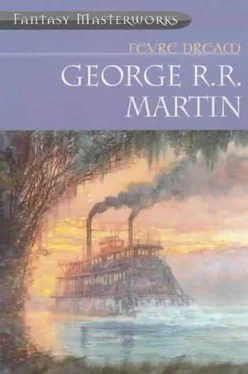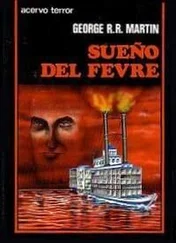George Martin - Fevre Dream
Здесь есть возможность читать онлайн «George Martin - Fevre Dream» весь текст электронной книги совершенно бесплатно (целиком полную версию без сокращений). В некоторых случаях можно слушать аудио, скачать через торрент в формате fb2 и присутствует краткое содержание. Жанр: Фэнтези, на английском языке. Описание произведения, (предисловие) а так же отзывы посетителей доступны на портале библиотеки ЛибКат.
- Название:Fevre Dream
- Автор:
- Жанр:
- Год:неизвестен
- ISBN:нет данных
- Рейтинг книги:4 / 5. Голосов: 1
-
Избранное:Добавить в избранное
- Отзывы:
-
Ваша оценка:
- 80
- 1
- 2
- 3
- 4
- 5
Fevre Dream: краткое содержание, описание и аннотация
Предлагаем к чтению аннотацию, описание, краткое содержание или предисловие (зависит от того, что написал сам автор книги «Fevre Dream»). Если вы не нашли необходимую информацию о книге — напишите в комментариях, мы постараемся отыскать её.
Fevre Dream — читать онлайн бесплатно полную книгу (весь текст) целиком
Ниже представлен текст книги, разбитый по страницам. Система сохранения места последней прочитанной страницы, позволяет с удобством читать онлайн бесплатно книгу «Fevre Dream», без необходимости каждый раз заново искать на чём Вы остановились. Поставьте закладку, и сможете в любой момент перейти на страницу, на которой закончили чтение.
Интервал:
Закладка:
Green swallowed. “Cap’n, like I said, the Fevre Dream -”
“Not her!” Marsh said, stamping his stick down hard. “My other steamboat. Where the hell is my other steamboat, now that I need her?”
CHAPTER TWENTY-TWO
Aboard the Steamer Eli Reynolds, Mississippi River, October 1857
On a cool evening in early autumn, Abner Marsh and the Eli Reynolds finally left St. Louis and headed downstream in search of the Fevre Dream. Marsh would just as soon have left several weeks earlier, but there had been too much to do. He’d had to wait for the Eli Reynolds to get back from her latest trip up the Illinois, and check her over to make sure she was fit for the lower river, and hire himself a couple of Mississippi pilots. Marsh had claims to settle as well, from planters and shippers who’d entrusted St. Louis-bound freight to the Fevre Dream down in New Orleans, and were irate at the steamer’s disappearance. Marsh might have insisted they share his loss, but he’d always prided himself on being fair, so he paid them off fifty cents on the dollar. There was also the unpleasant task of talking to Mister Jeffers’ relations-Marsh figured he could hardly tell them what had really happened, so he finally settled for the yellow fever yarn. Other folks had brothers or sons or husbands still unaccounted for and they pestered Marsh with questions he couldn’t answer, and he had to deal with a government inspector and a man from the pilots’ association, and he had accounts to square and books to go over and preparations to make, and it all toted up into a month of delay, frustration, and bother.
But all the while, Marsh kept on looking. When the letters that Green had sent out on his behalf got no response, he sent out more. He met incoming steamers as often as he could find the time, and asked after the Fevre Dream, after Joshua York, after Karl Framm and Whitey Blake and Hairy Mike Dunne and Toby Lanyard. He hired a couple of detectives and sent them downriver, with instructions to find out what they could. He even borrowed a trick from Joshua, and started buying newspapers from all up and down the river system; he spent his nights poring over the shipping columns, the advertisements, the lists of steamboat arrivals and departures from cities as distant as Cincinnati and New Orleans and St. Paul. He frequented the Planters’ House and other river haunts even more than was his custom, and asked a thousand questions.
And learned nothing. The Fevre Dream was gone, it seemed, just plain gone from the river. No one had seen her. No one had talked to Whitey Blake or Mister Framm or Hairy Mike, or heard anything about them. The newspapers didn’t list her coming or going.
“It ain’t sensible,” Marsh complained loudly to the officers of the Eli Reynolds, a week before their departure. “She’s three hundred sixty-foot long, brand new, fast enough to make any steamboatman blink. A boat like that has got to get noticed.”
“Unless she went down,” suggested Cat Grove, the Eli Reynolds’ short, wiry mate. “There’s places on the river deep enough to drown whole towns. Could be she sunk, with all aboard.”
“No,” said Marsh stubbornly. He hadn’t told them the whole story. He didn’t see how he could. None of them had been aboard the Fevre Dream; they’d never believe him. “No, she ain’t sunk. She’s down there somewhere, hidin’ from me. But I’m goin’ to find her.”
“How?” asked Yoerger, the captain of the Eli Reynolds.
“It’s a long river,” Marsh admitted, “and it’s got lots of creeks and smaller rivers and bayous leadin’ off it, cutoffs, and chutes, and bends, and all kinds of places a steamer can hide where she won’t be seen easy. But it ain’t so long that it can’t be searched. We can start at one end and go to the other, and ask questions along the way, and if we reach New Orleans and we still ain’t found her, then we can do the same on the Ohio and the Missouri and the Illinois and the Yazoo and the Red River and wherever the hell we got to go to find that goddamned boat.”
“Could take a while,” said Yoerger.
“And if it does?”
Yoerger shrugged, and the officers of the Eli Reynolds traded uncertain glances. Abner Marsh scowled. “Don’t you worry your head about how long it’s goin’ to take,” he snapped. “You just get my steamboat ready, you hear?”
“Yes sir, Cap’n,” Yoerger said. He was a tall, stooped, gaunt old man with a quiet voice, and he’d been working steamboats since there had been steamboats, so nothing much surprised him anymore, and his tone said as much.
When the day came, Abner Marsh wore his white captain’s coat with the double row of silver buttons. It seemed fitting somehow. He ate himself a huge supper at the Planters’ House-the provisions on the Eli Reynolds weren’t too good, and the cook was barely fit to scrub out Toby’s fry pans-and walked down to the landing.
The Eli Reynolds had her steam up, Marsh saw with approval. Still, she didn’t look like much. She was an upper river boat, built small and narrow and low for the shallow tight streams where she had to ply her trade. She was less than a fourth as long as the vanished Fevre Dream, and about half as wide, and full-loaded she could carry maybe 150 tons of cargo, against the thousand tons of the larger steamer. The Reynolds had only two decks; there was no texas, and the crew occupied the forward portion of the cabins on the boiler deck. She seldom had any cabin passengers anyway. A single big high-pressure boiler drove her stern wheel, and she was as plain as all get out. She was near empty of cargo now, so Marsh could see the boiler, sitting well forward. Rows of plain whitewashed wooden pillars supported the upper decks, looking like rickety stilts, and the columns that held up the weathered promenade roof were square and simple, plain as a picket fence. The aft wheelhouse was a big square wooden box, the stern wheel a sorry-looking afterthought, its red paint faded and streaked from long use. Elsewhere paint was flaking. The pilot house was a damn wood-and-glass outhouse set atop the steamboat, and the stubby chimneys were unadorned black iron. The Eli Reynolds showed her age sitting there in the water; she looked terribly weary and a bit lopsided, as if she was about to keel over and sink.
She was a damn unlikely match for the huge, powerful Fevre Dream. But she was all he had now, Abner Marsh reflected, and she would have to do. He walked on down to the steamer and climbed aboard, across a stage that had been badly worn by the tread of countless boots. Cat Grove met him on the forecastle. “All ready, Cap’n.”
“Tell the pilot to take her out,” Marsh said. Grove shouted up the order, and the Eli Reynolds sounded its whistle. The blast was thin and plaintive, and hopelessly brave, Marsh thought. He clomped up the steep, narrow stair to the main cabin, which was dim and cramped-feeling, barely forty foot long. The carpet was bare in spots, and the landscapes painted on the stateroom doors had long since faded into dullness. The whole interior of the steamer had an odor about it of stale food and sour wine and oil and smoke and sweat. It was unpleasantly hot, too, and the single plain skylight was too grimed-over to admit much light. Yoerger and the off-duty pilot were drinking cups of black coffee at a round table when Marsh entered. “My lard aboard?” Marsh asked.
Yoerger nodded.
“Not much else aboard, that I saw,” Marsh commented.
Yoerger frowned. “I figured you’d like it that way, Cap’n. Loaded up, we’d be slower, and there’d be more stops to make, too.”
Abner Marsh pondered that, and nodded in approval. “Good,” he said. “Makes sense. My other package get delivered?”
“In your cabin,” Yoerger said.
Читать дальшеИнтервал:
Закладка:
Похожие книги на «Fevre Dream»
Представляем Вашему вниманию похожие книги на «Fevre Dream» списком для выбора. Мы отобрали схожую по названию и смыслу литературу в надежде предоставить читателям больше вариантов отыскать новые, интересные, ещё непрочитанные произведения.
Обсуждение, отзывы о книге «Fevre Dream» и просто собственные мнения читателей. Оставьте ваши комментарии, напишите, что Вы думаете о произведении, его смысле или главных героях. Укажите что конкретно понравилось, а что нет, и почему Вы так считаете.












